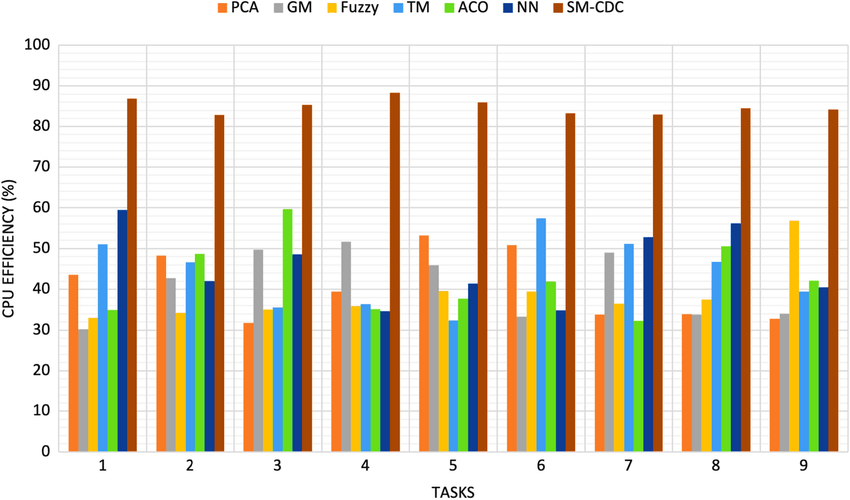CPU affinity in Android allows you to control which CPU cores an app or process uses. This can improve performance and battery life by efficiently managing resources.
CPU affinity Android helps you decide which CPU cores an app or process should use. This can make your device run faster and save battery. By setting CPU affinity, you can ensure important apps get the resources they need, improving overall performance.
In this article, we will discuss “CPU affinity android”.
What Is CPU Affinity?
CPU affinity is a way to control which CPU cores a specific app or process uses. By setting CPU affinity, you can make sure that important apps get the right amount of power and resources. This helps improve performance and can save battery life on your Android device.
What Is The Importance Of CPU Affinity In Computing?
CPU affinity is important because it lets you control which CPU cores a process uses. This helps improve performance by making sure key tasks get enough power. It also saves battery life by managing resources better. Overall, CPU affinity makes devices run more efficiently.

Read More: Cpu_Affinity_Ignore – Improve Resource Management 2024!
How Does CPU Affinity Work On Android?
Understanding CPU Cores:
Android devices have multiple CPU cores. Each core can handle different tasks. CPU affinity lets you choose which cores will work on specific tasks or apps.
Process Management:
When an app or process runs, the Android system decides which CPU cores it will use. With CPU affinity, you can set this manually to improve performance for that app or process.
Setting Affinity:
You can set CPU affinity through commands or programming. For example, using tools like TaskSet, you can specify which cores an app should use. This can be useful for balancing the load or improving response time.
Improving Performance:
By directing an app to specific cores, CPU affinity helps manage how resources are used. This can lead to faster processing and a smoother experience, especially for apps that need a lot of power.
Saving Battery:
Properly managing which cores are used can also help save battery life. By avoiding unnecessary use of all cores, your device can run more efficiently.
System Efficiency:
Overall, CPU affinity helps in balancing the workload across different cores, making sure that the system runs smoothly and efficiently, enhancing both performance and battery life.

What Are The Benefits Of CPU Affinity?
CPU affinity offers several benefits: it improves app performance by assigning specific cores to important tasks, helps save battery by using fewer cores, and makes the system run more smoothly.
Setting CPU Affinity On Android:
- Using Taskset Command: Run the Taskset command in a terminal to choose which CPU cores a process uses.
- Programming: Developers can set CPU affinity in their app code using Android’s libraries.
- Tools and Apps: Use specialized tools or apps for an easy way to set CPU cores for different apps.
- Root Access: Some methods require root access for system-level changes.
- Configuration Files: Advanced users can edit system files to set CPU affinity, but this is complex.
Practical Examples:
- Gaming: Set CPU affinity to prioritize gaming apps for better performance.
- Background Apps: Limit background apps to use fewer cores, saving battery.
- Video Editing: Assign more cores to video editing apps for faster processing.
What Tools And Applications Are Available For Managing CPU Affinity?
To manage CPU affinity, you can use tools like Taskset, which lets you set CPU cores for specific processes via the command line.

Apps like “Kernel Adiutor” or “CPU Control” provide user-friendly interfaces for adjusting CPU settings. Some Android devices also have built-in options for managing CPU usage.
What Are The Challenges And Considerations For Managing CPU Affinity?
Challenges of managing CPU affinity include the need for root access on some devices and the potential for causing system instability if not done correctly.
Considerations include ensuring that important apps get enough resources while avoiding overloading specific cores.
Read More: CPU Core Temperatures Rise And Fall Impossibly – Ensure Accurate Temperatures!
Is CPU Affinity Good?
Yes, CPU affinity can be good. It helps improve performance by assigning specific cores to important tasks and can save battery by using fewer cores. However, it needs careful management to avoid system issues or instability.
How Do I See CPU Usage On My Android Phone?
To see CPU usage on your Android phone, go to Settings > Developer options > CPU usage. If you don’t see Developer options, enable it by tapping the Build number multiple times in About phone. You can also use apps like “CPU-Z” to monitor CPU usage.
What Does CPU Mean On An Android Phone?
On an Android phone, CPU stands for Central Processing Unit. It’s the main part of the phone that handles instructions and runs apps. It works like the brain of the phone, making sure everything operates smoothly and efficiently.
How To Check The Current CPU Affinity Of A Process In Android?
To check the current CPU affinity of a process on Android, you need to use a terminal app or command line tool. Commands like Taskset can show which CPU cores a process is using. Advanced users may need root access to view or change this setting.
What Is The CPU Control App For Android?
The CPU Control app for Android allows users to manage CPU settings, including setting CPU affinity. It helps you control which cores are used for specific tasks, improving performance or saving battery.

How Do You Set CPU Affinity On Android Devices?
To set CPU affinity on Android devices, you can use a terminal app with commands like TaskSet or use special apps like “CPU Control.” You might need root access to change CPU settings. This helps control which CPU cores an app or process uses for better performance.
Read More: What Is Hammering The CPU When Top Is Not Running? – Upgrade Your Knowledge Today!
Why Is My CPU Usage 100 Percent On My Android Phone?
Your CPU usage might be at 100% on your Android phone because an app or process is using too much power. This can happen with heavy apps, background processes, or system issues.
Can CPU Affinity Cause Any Issues In Android Devices?
Yes, CPU affinity can cause issues if not used properly. It might make some apps run poorly if they don’t get enough CPU power. It can also lead to overheating or battery drain if not managed well.
How Does CPU Affinity Affect Multi-Core Processors?
CPU affinity affects multi-core processors by controlling which cores a process uses. This can help improve performance by balancing the load or focusing power on specific cores.
Can CPU Affinity Reduce Power Consumption?
Yes, CPU affinity can reduce power consumption. By limiting which CPU cores are used, you avoid unnecessary power use. This helps save battery life, especially if you assign less demanding tasks to fewer cores or turn off unused cores.
How Does CPU Affinity Relate To Thread Management In Android?
CPU affinity relates to thread management by deciding which CPU cores handle specific threads or tasks. In Android, managing CPU affinity helps ensure that important threads get the right amount of power, improving performance and efficiency by balancing the load across available cores.

Read More: CPU On Ubuntu Running High – GPU – A Complete Guide Of 2024!
Frequently Ask Questions:
1. Can I Change CPU Affinity Without Rooting My Device?
No, changing CPU affinity usually requires root access on most devices.
2. Does CPU Affinity Affect App Speed?
Yes, setting CPU affinity can make some apps run faster by using specific cores.
3. How Often Should I Adjust CPU Affinity?
Only adjust CPU affinity when necessary, like if you notice performance issues or need to optimize specific apps.
4. Can CPU Affinity Settings Be Reset?
Yes, you can reset CPU affinity settings to default or adjust them again as needed.
5. What Happens If I Set CPU Affinity Incorrectly?
Incorrect settings can cause apps to run poorly or may slow down your device.
6. Does CPU Affinity Affect All Apps On My Device?
No, it only affects the apps or processes you specifically set affinity for.
7. Can CPU Affinity Improve Gaming Performance On Android?
Yes, setting CPU affinity can help games run smoother by using specific cores for game processes.
8. Are There Any Risks To Changing CPU Affinity?
Yes, improper settings can lead to system instability or reduced performance.
9. How Do I Know If CPU Affinity Is Working?
You can monitor performance and CPU usage to see if the changes improve efficiency or speed.
10. Can I Use CPU Affinity On Older Android Versions?
It depends on the version and device. Newer tools and methods are more compatible with recent Android versions.
Conclusion:
In conclusion, managing CPU affinity on Android can enhance your device’s performance and battery life by controlling which CPU cores handle specific tasks. While it can provide significant benefits, it requires careful management and sometimes root access. By understanding and using CPU affinity properly, you can make your Android device run more efficiently.
Also Read:
- What Is CPU Graphics Called? – Comprehensive Guide Of 2024!
- What Is CPU Package Temperature – A Comprehensive Guide Of 2024!
- Where Is The CPU Stored – A Complete Guide Of 2024!
- CPU Heavy Settings In Games – Optimize Game Settings!
